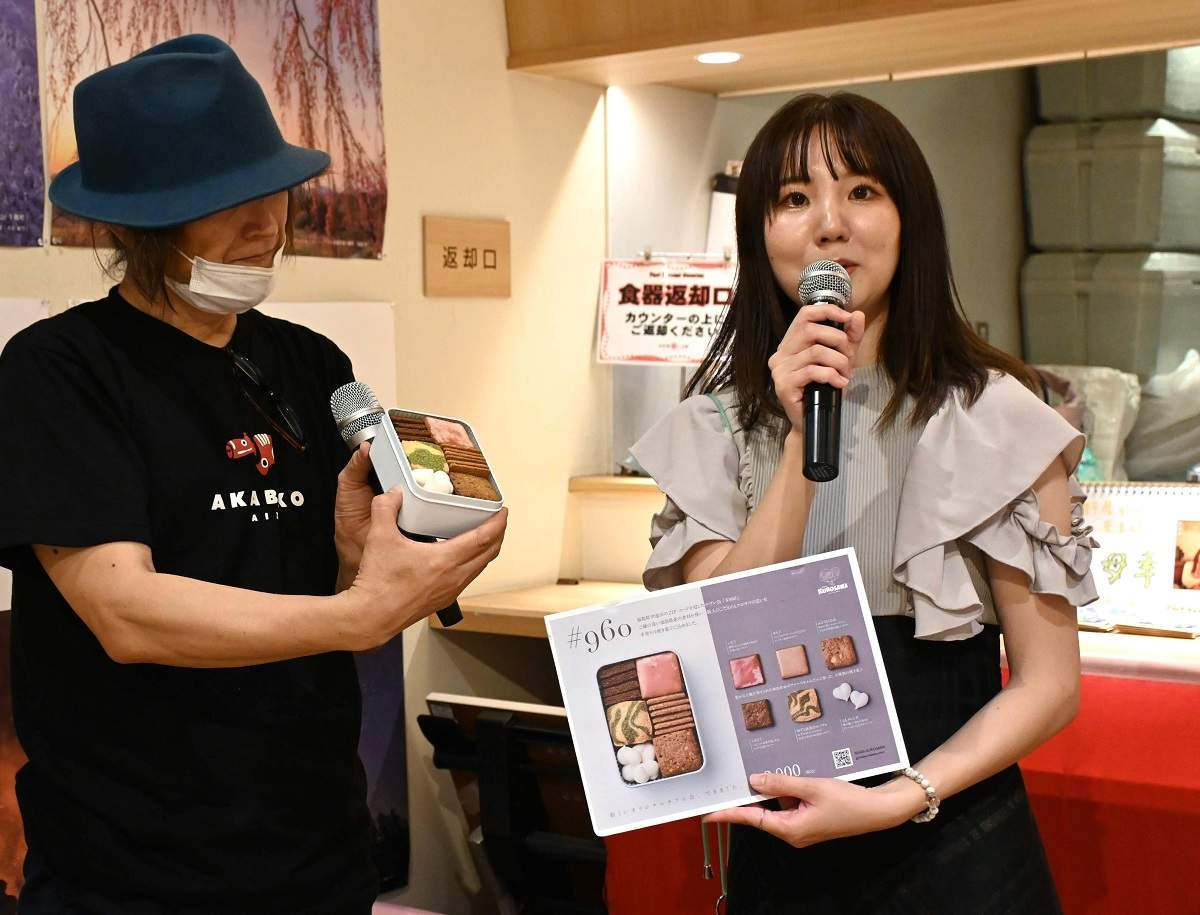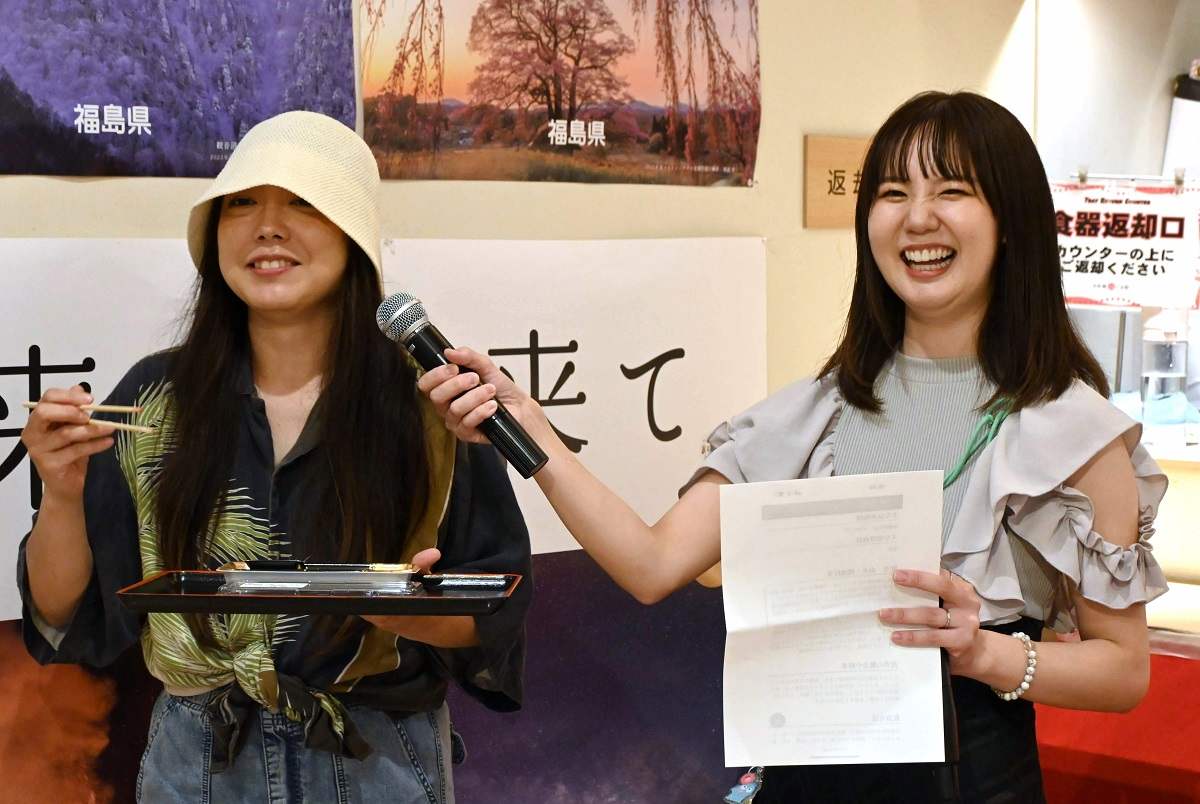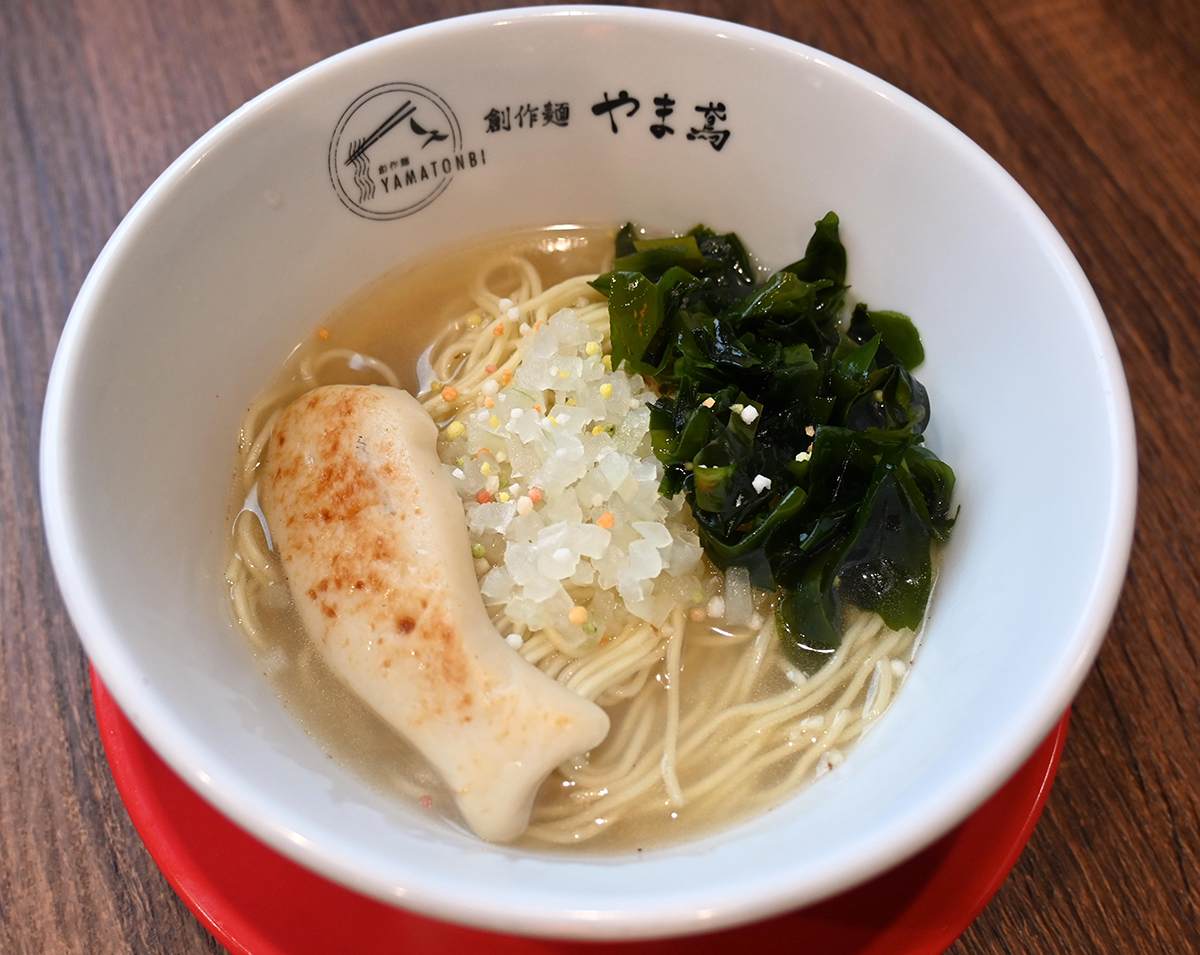Fukushima Ramen Shop Proprietress Promotes Prefecture as Tourism Ambassador; Hopes to Introduce Fukushima’s Appeal to Younger Generation

Mami Hasegawa, right, promotes Fukushima cookies with an artist that performed at Midette in Nihombashi, Tokyo, on June 16.
14:19 JST, July 7, 2024
Mami Hasegawa was in high school when the 2011 Great East Japan Earthquake struck, destroying her school, and uprooting her life. Ever since then she has wanted to help the region recover.
Hasegawa is the proprietress of Yamatonbi, a ramen shop in Iwaki, Fukushima Prefecture, that she runs with her husband. The couple contributes to recovery efforts by serving dishes using broth made from Fukushima fish products called joban mono.
In May this year, the 29-year-old was appointed as an Attaka (heart-warming) Fukushima Tourism Exchange Ambassador.
“I am happy because I wanted to do something to promote Fukushima more widely,” Hasegawa said, enthusiastic about her new role.
Hasegawa planned an event in Tokyo as a tourism ambassador soon afterwards.

Mami Hasegawa, right, promotes Fukushima food with Okami Utada who performed at Midette in Nihombashi, Tokyo, on June 16.
One night in June, singer-songwriter Okami Utada’s voice floated in the air alongside a ukulele’s soft melody. Midette, a shop in Nihombashi, Tokyo, that sells Fukushima goods, was the venue for a small concert supporting the prefecture on June 16. Four artists Hasegawa got in touch with performed at the event, which promoted local sake and other products such as cookies and kamaboko fish cake. The live-streamed concert was so popular that some attendees had to stand at the shop.
“I wanted to introduce Fukushima’s appeal in a unique way to the younger generation,” she said.
Foiled study abroad dreams
The ramen shop that Hasegawa started in 2017 with her husband, Shuta Magariyama, 40, is popular for serving ramen using fresh seafood that she bids for at a local fishing port. The shop was featured in The Japan News’ popular column Ramen of Japan. In addition to running the ramen store, she also works as an emcee and model and is a mother of two. She energetically displays her multiple talents.
It wasn’t always like this for her.
“My dream of studying abroad was foiled twice,” she said. The 2011 earthquake struck while she was preparing for her track and field club activities as a first-year student at Yumoto High School.
The school was destroyed, and she had to spend the next two years until graduation studying in a temporary prefabricated building. She also experienced evacuated life for several weeks due to the radiation leakage from the Fukushima No. 1 nuclear power plant and her planned summer study abroad program was cancelled.
After graduating from high school, she enrolled in a university in Tokyo where she planned to study overseas in Cambodia. Hasegawa hoped to gain “an international perspective” while studying to become a teacher. However, she then learned that her father had been diagnosed with cancer.
As she deliberated whether to continue her university education, she heard that her hometown of Iwaki City was looking for a tourism ambassador. She applied for the Sunshine Guide Iwaki position and was accepted. Hasegawa left her university and spent three years as a tourism ambassador promoting local agricultural produce as well as fighting harmful rumors about the prefecture’s products. It was during this time that she met and married her husband Shuta, also from Iwaki. Shuta had plans to open a ramen shop to help revitalize the region, and that is how she became the shop’s proprietress.
As a guide for Iwaki, she only promoted the town, but prefectural tourism ambassadors are responsible for promoting Fukushima as a whole. There are currently 378 Attaka Fukushima Tourism Exchange Ambassadors, according to the prefecture’s tourism exchange division. Ambassadors are not paid and have no limit on how long they can serve. They engage in PR activities based on their own experience.
Hasegawa, who joined the group, said, “I would like to introduce Fukushima from various perspectives and do my best for many years to come.”
Recently, she had an interesting experience. When an association to deepen ties between Fukushima and Cambodia was created, she emceed its inaugural meeting. “Cambodia, a country where I wanted to go when I was a student instead came to me,” she said. “What a coincidence!” She hopes to open a ramen shop in Cambodia in the future.
Top Articles in Society
-

Producer Behind Pop Group XG Arrested for Cocaine Possession
-

Man Infected with Measles Reportedly Dined at Restaurant in Tokyo Station
-

Man Infected with Measles May Have Come in Contact with Many People in Tokyo, Went to Store, Restaurant Around When Symptoms Emerged
-

Woman with Measles Visited Hospital in Tokyo Multiple Times Before Being Diagnosed with Disease
-

Australian Woman Dies After Mishap on Ski Lift in Nagano Prefecture
JN ACCESS RANKING
-

Producer Behind Pop Group XG Arrested for Cocaine Possession
-

Japan PM Takaichi’s Cabinet Resigns en Masse
-

Man Infected with Measles Reportedly Dined at Restaurant in Tokyo Station
-

Israeli Ambassador to Japan Speaks about Japan’s Role in the Reconstruction of Gaza
-

Videos Plagiarized, Reposted with False Subtitles Claiming ‘Ryukyu Belongs to China’; Anti-China False Information Also Posted in Japan

























